Patriarch Kirill meets with delegation of the World Council of Churches.

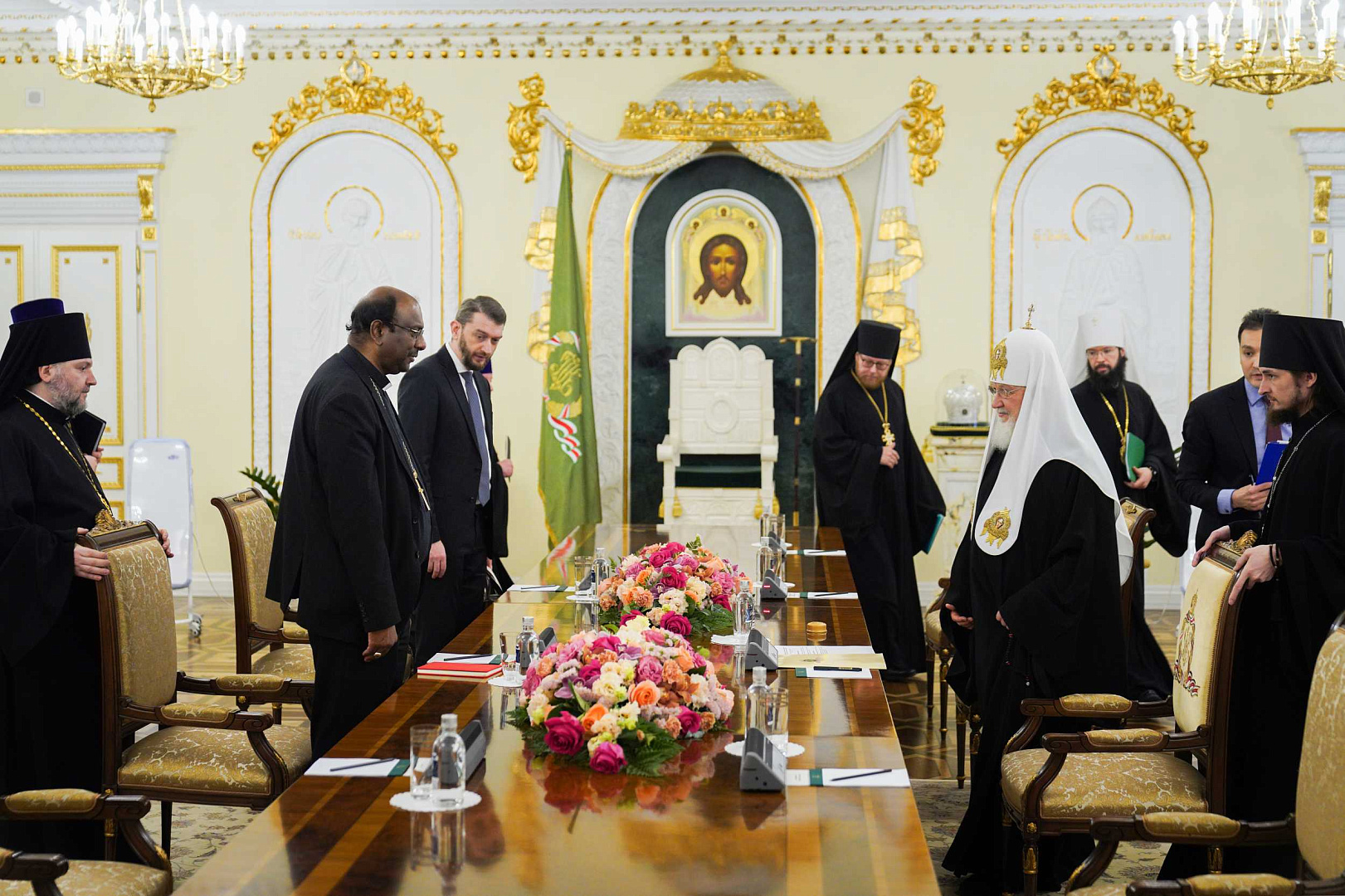
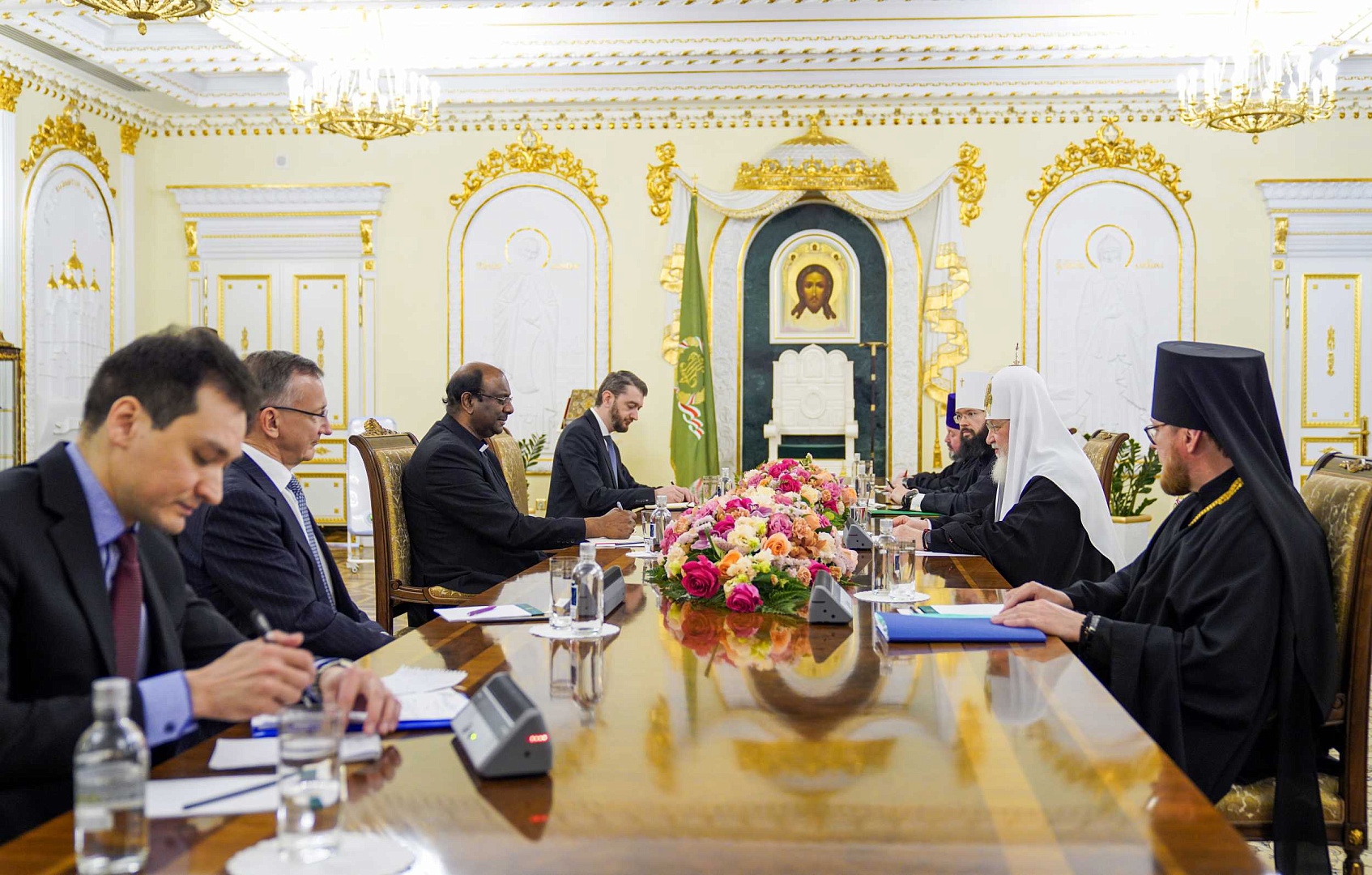
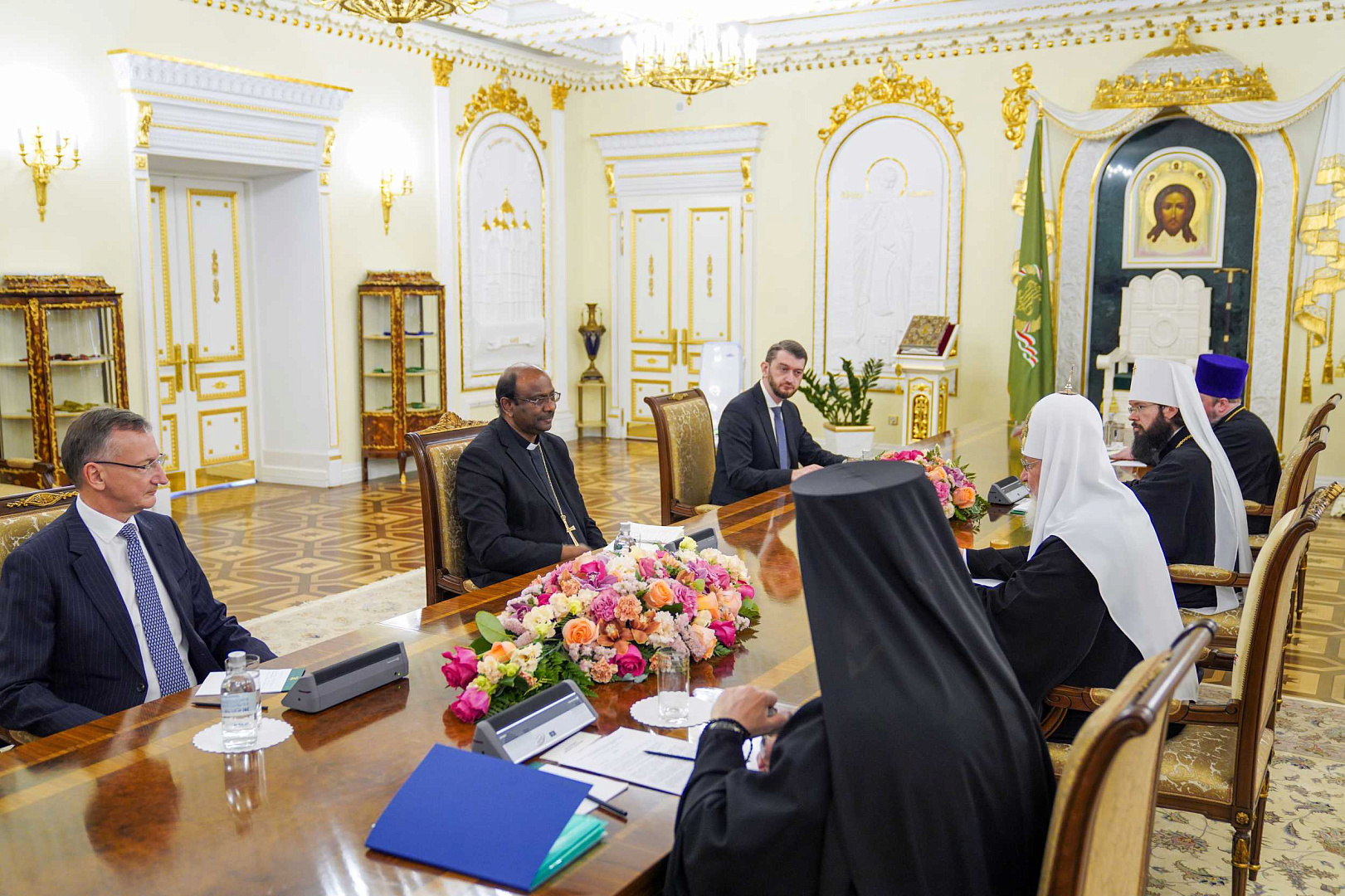
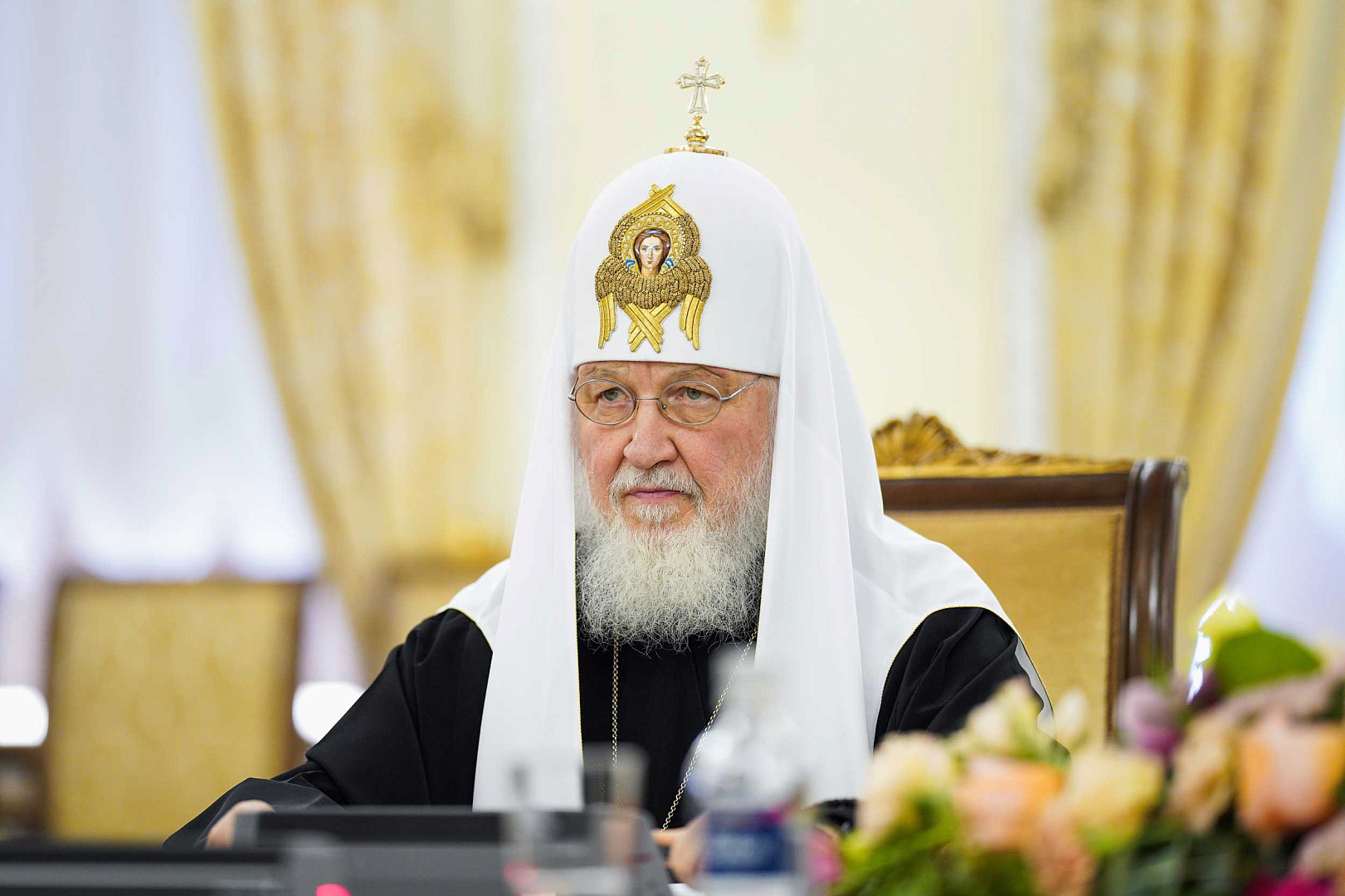
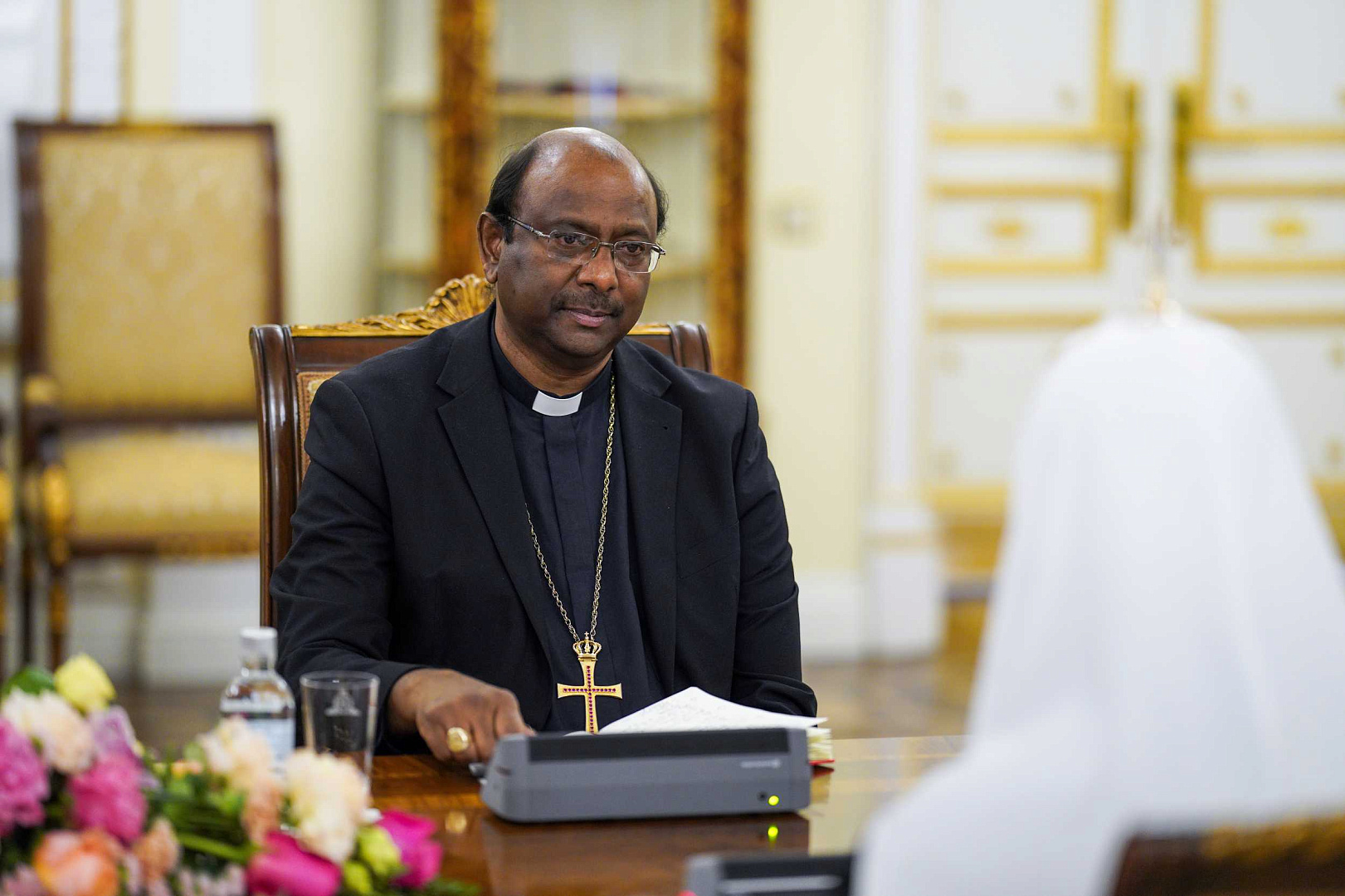
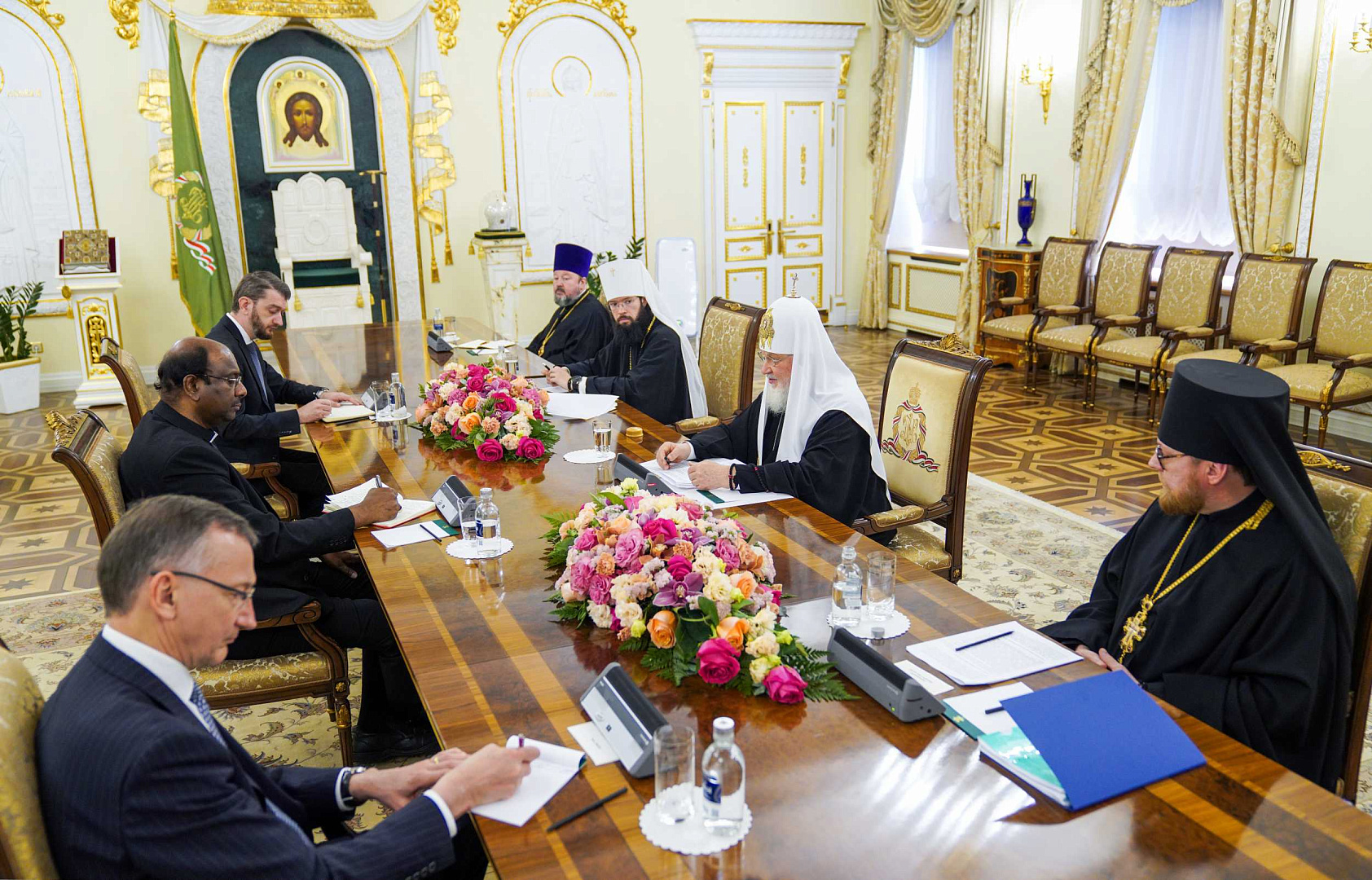
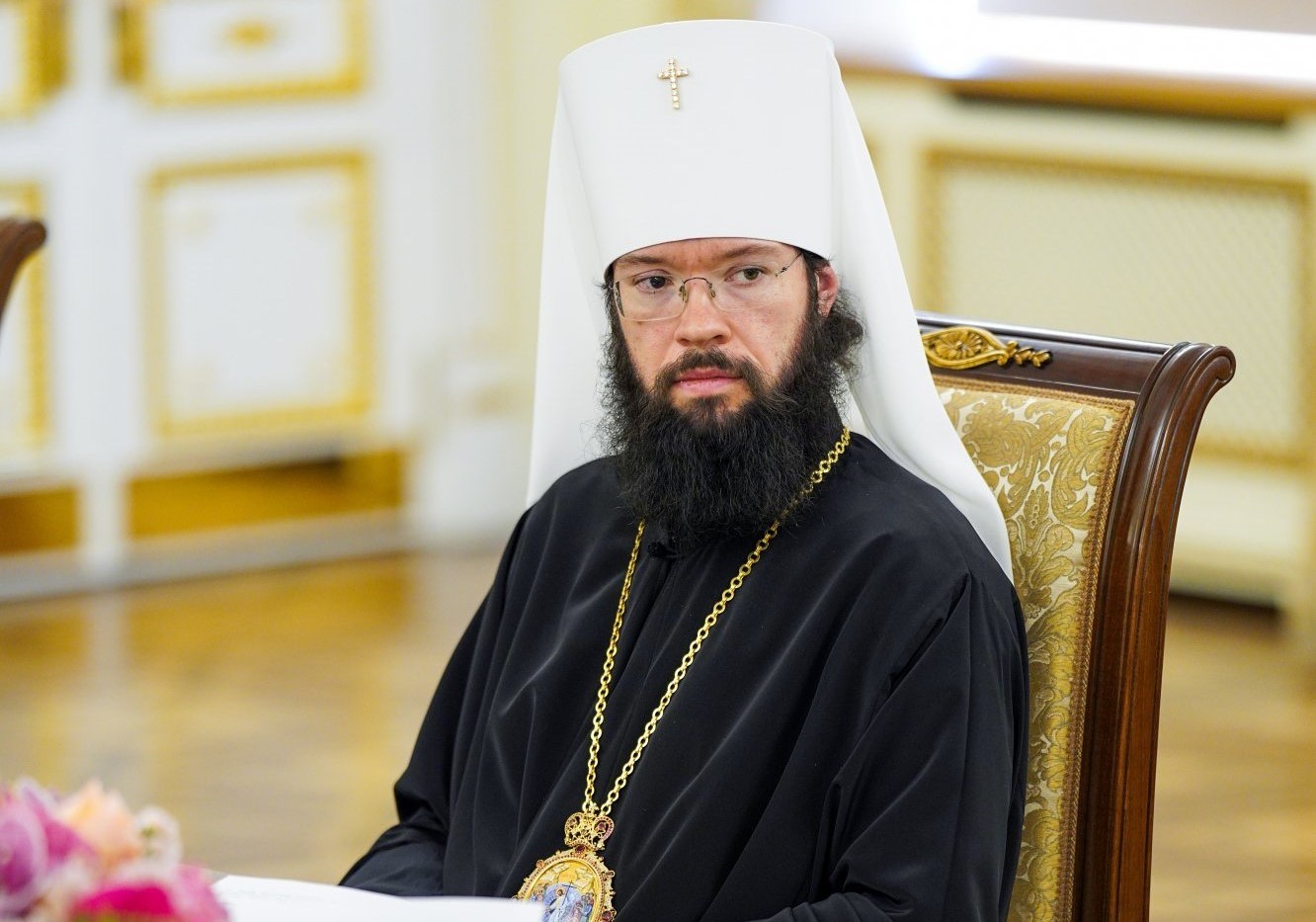
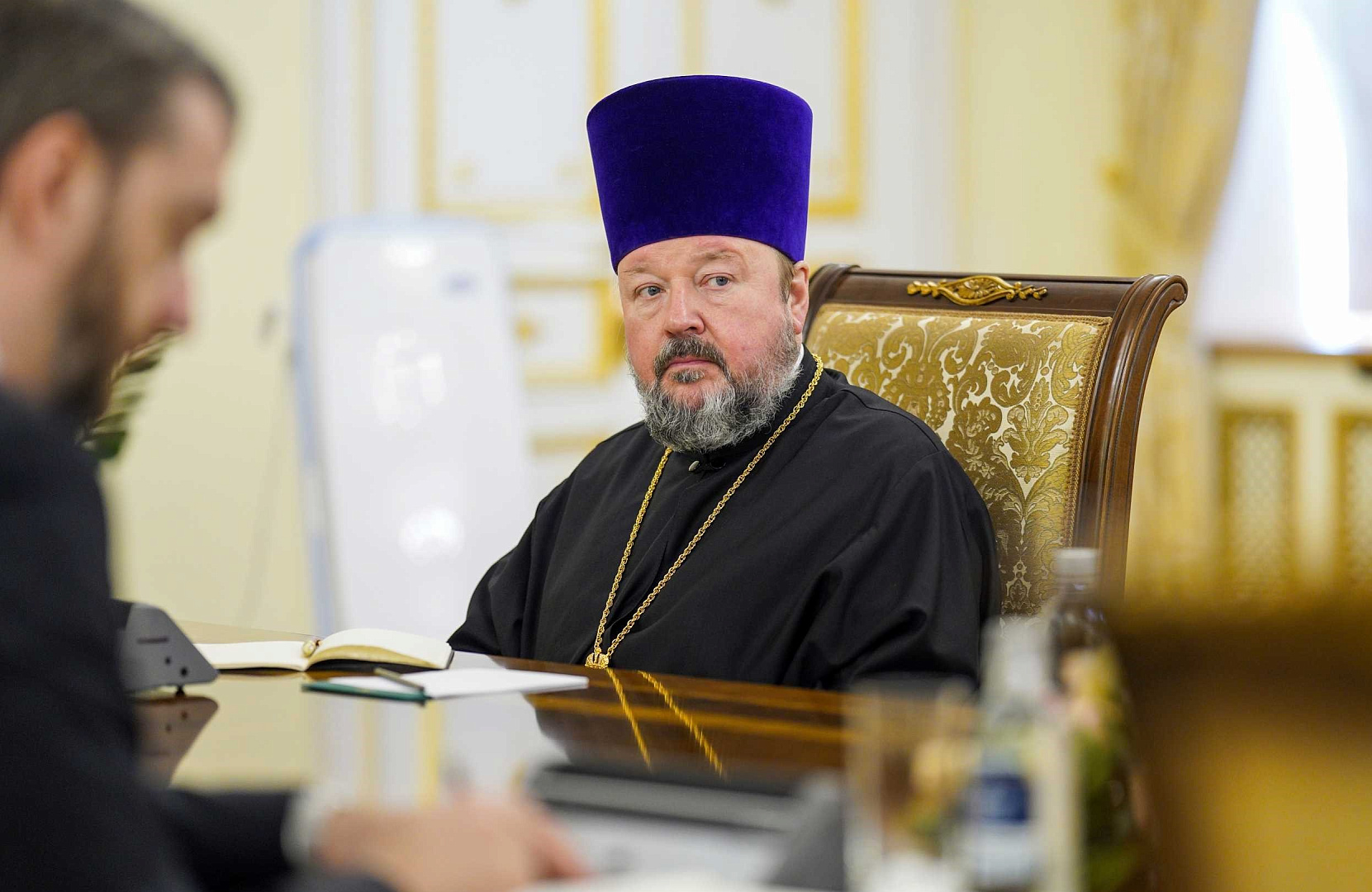
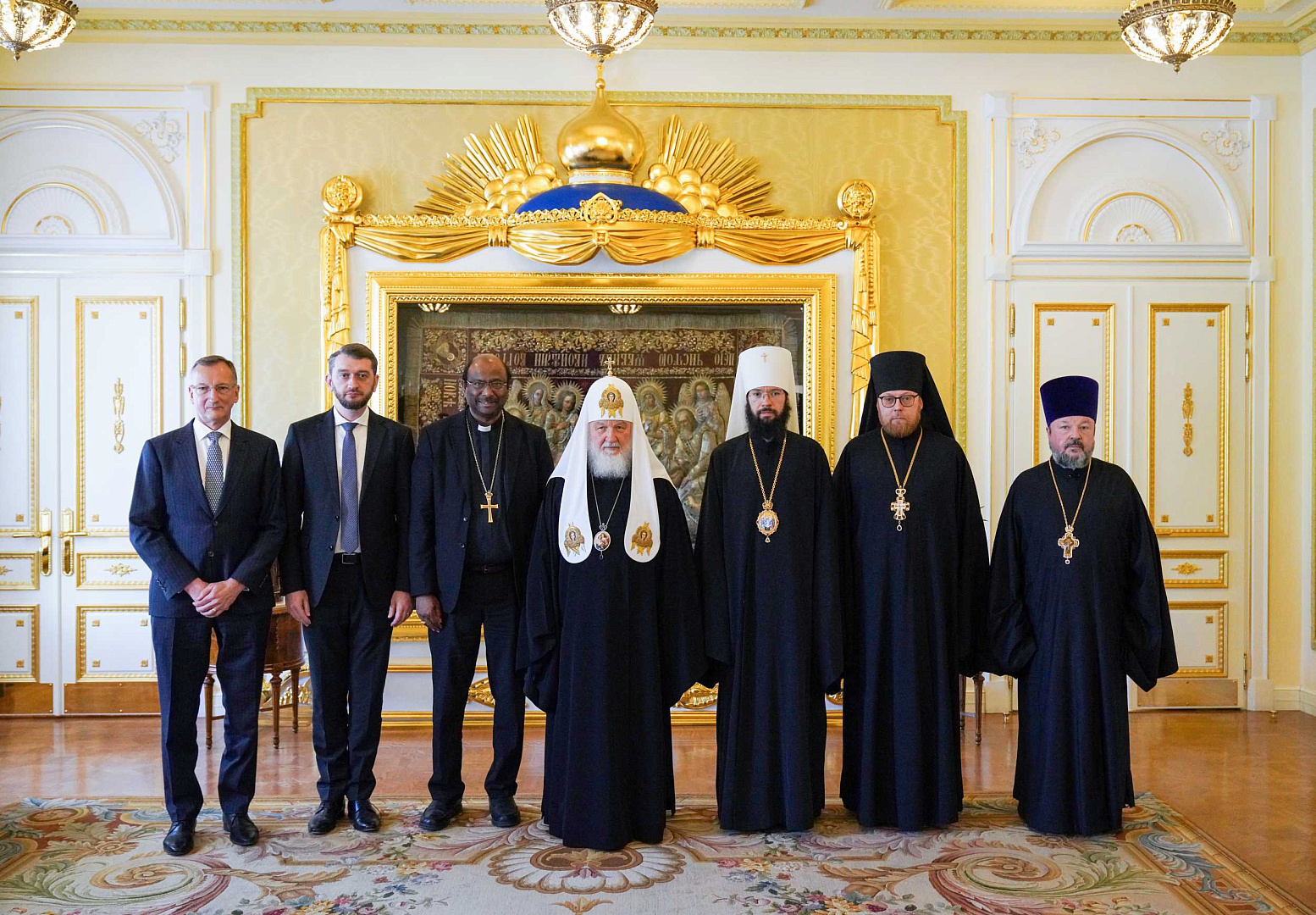
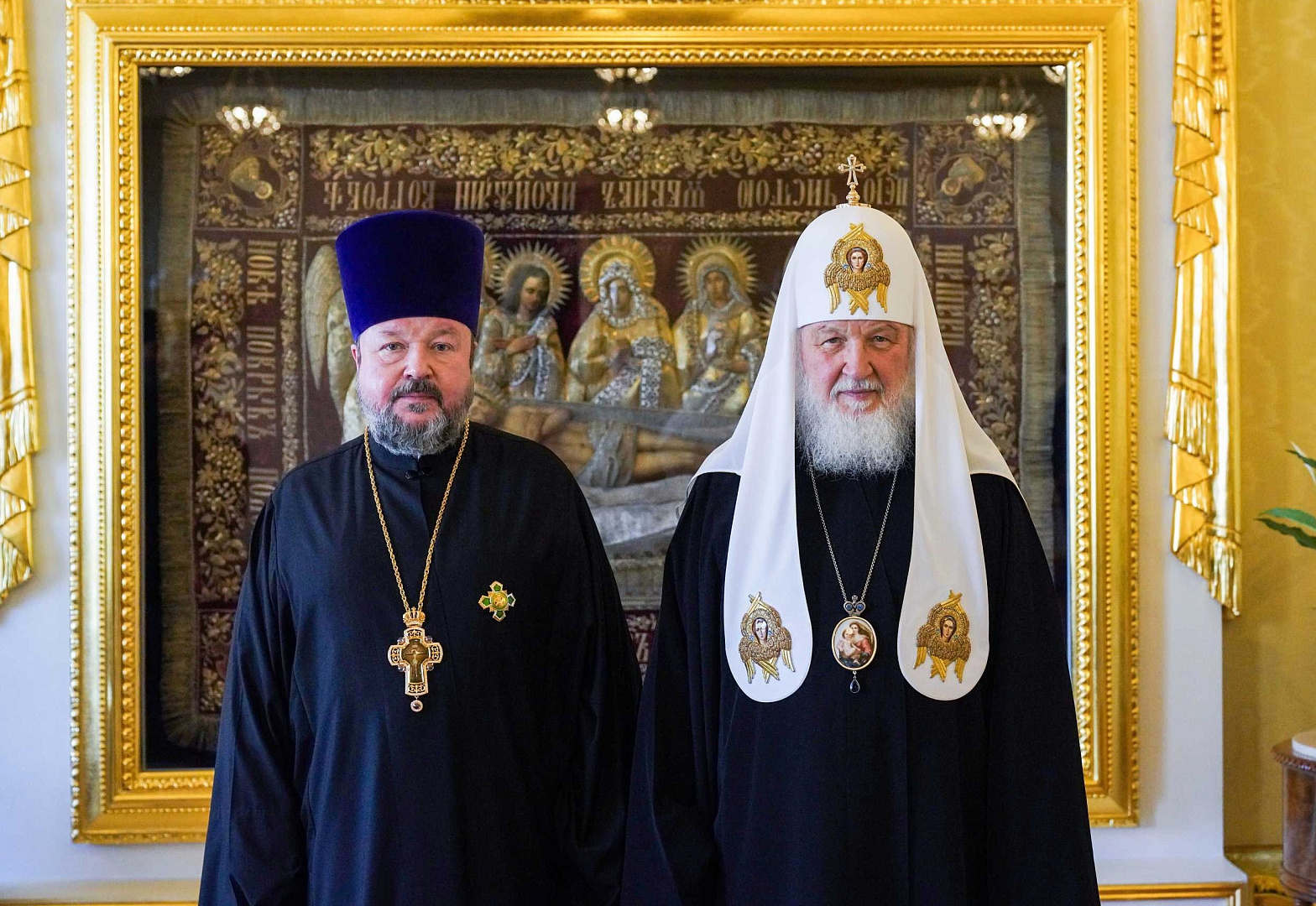
DECR Communication service, 17.05.2023.
On 17th May 2023 a meeting took place between His Holiness the Patriarch of Moscow and All Russia Kirill and a delegation fr om the World Council of Churches at the Patriarchal residence of Saint Daniel’s Monastery in Moscow.
The delegation consisted of WWC general secretary Rev. Prof. Dr Jerry Pillay, WWC director of the Commission of the Churches on International Affairs Peter Prove and WWC programme executive for Ecumenical Relations and Faith and Order Prof Dr Vasile-Octavian Mihoc.
Also participating in the meeting were the chairman of the Department for External Church Relations the metropolitan of Volokolamsk Anthony, deputy chairman of the DECR archimandrite Philaret (Bulekov) and the representative of the Russian Orthodox Church to the WWC and international organizations in Geneva archpriest Mikhail Gundyaev.
His Holiness Patriarch Kirill warmly greeted the guests and congratulated Dr Jerry Pillay on his election to the post of WWC general secretary.
His Holiness shared his memories of his participation in the work of the WWC, which began in 1968 with General Assembly in Upsala, wh ere the future Patriarch was the youngest participant in the event. “Our relationship with the World Council of Churches is one of the top priorities on our agenda,” said the Primate of the Russian Orthodox Church, noting that the presence of a permanent representative to the WWC allows people to be aware of the organization’s work at any particular time. Moreover, students fr om the Russian Orthodox Church are regularly sent to study at the Bossey Ecumenical Institute under the World Council of Churches.
In speaking of the priorities of the Russian Orthodox Church with regard to her relationship with the WWC, His Holiness the Patriarch of Moscow and All Russia Kirill emphasized that “we value and positively assess the fact that a committee for consensus and cooperation has been set up at the World Council of Churches. The Orthodox Churches form a minority in the organization, and therefore for the voice of the Orthodox to be heard, the principle of consensus when resolving vital issues is very important from our perspective.”
His Holiness the Patriarch also touched upon the subject of bilateral contacts with various Christian confessions and organizations. “We are in constant contact and dialogue with the Roman Catholic Church. We also have at our disposal the means to communicate with the Evangelical Church in Germany and the Evangelical Lutheran Church of Finland – we have a long history of bilateral relations with these churches and they played a very important role in the Cold War period. The Church of Russia is also developing relations with the ancient Oriental Churches; we have joint working groups for dialogue with the Coptic Church, the Assyrian Church of the East, the Ethiopian Church and the Malankara Orthodox Syrian Church of India,” he said, noting that the WWC “offers a platform in particular for the development of bilateral relationships, at times with those churches with which it is quite difficult to establish relations, for example, because of the great distances involved.”
In his address to the general secretary and other members of the WWC delegation, His Holiness Patriarch Kirill emphasized that the Russian Orthodox Church was seriously concerned by the persecution of Christians in various regions of the world. “You know that there are various reasons for this horrible phenomenon,” said His Holiness. “We express solidarity with the WWC in calling upon the international community to guarantee religious freedom and act against the persecution of Christians. We endeavour for our part to give support to Christians in Africa and the Middle East both within the context of our bilateral relations and in using all comprehensive means available.”
The Patriarch shared with the WWC delegation his understanding of the religious situation in Ukraine, the situation of the Ukrainian Orthodox Church and the events which have precipitated an inter-church crisis. “I must say that we are particularly saddened by the fact that the Patriarchate of Constantinople is involved in this conflict. It is its involvement in the inter-church crisis in Ukraine which makes difficult our participation in commissions and committees which are headed by various representatives of Constantinople,” he noted.
His Holiness reminded those present that the crisis in Ukraine arose in 2014, emphasizing that “our Church immediately became involved in the efforts to reconcile the parties. We called for a peaceful resolution to the conflict at various forums, including the World Council of Churches.”
“Today, we are worried, concerned and pained by the worsening of the situation of the Ukrainian Orthodox Church within the state of Ukraine,” the Patriarch continued. “She brings together the greater part of Christians in Ukraine, but, unfortunately, at present they are subject to great pressure and limitations are imposed upon their activities. The means by which this pressure is applied are the schismatic groups that have been set up in Ukraine. These groups, unfortunately, receive the support of the Patriarch of Constantinople.”
As His Holiness the Patriarch noted, particular alarm and pain is caused by the use of direct pressure upon the canonical Church, include acts of violence: “Hundreds of Orthodox church buildings have been seized forcibly by the Ukrainian schismatics with the connivance of the local authorities. Clergy and laity, men and women have been subjected to physical violence.”
He pointed out that the Russian Orthodox Church had repeatedly appealed to the international community and bore testimony to the pressure brought to bear on Orthodox Christians in Ukraine. There were sent appeals to the primates of the Local Orthodox Churches, the Roman Catholic Church and the ancient Oriental Churches. “I would like to convey my heartfelt gratitude to the World Council of Churches for its statement concerning the situation which has arisen around the Monastery of the Caves in Kyiv, the monks of which are being persecuted for their wish to simply remain faithful members of their Church. All of this is happening with the participation and at times at the initiative of the Ukrainian authorities,” said His Holiness Patriarch Kirill to the WWC secretary.
His Holiness drew the attention of those participating in the conversation to the fact that after the XI General Assembly of the World Council of Churches, which took place in September of 2022 in Karlsruhe, personal sanctions were imposed by the president of Ukraine upon three members of the delegation of the Russian Orthodox Church for no more than the simple fact that they informally took part in a discussion on the Ukrainian problem.
What is happening in Ukraine goes beyond a local problem, assured Patriarch Kirill. “The situation is getting worse as every day passes,” he said. “The international community, unfortunately, remains silent, and today the Supreme Rada of Ukraine is discussing a bill which would ban the Ukrainian Orthodox Church. This silence on the part of the international community compels us to ask why. Why does the international community react so readily to many other conflicts, while in this instance we see nothing of the kind? It is my profound conviction that as religious people we are called upon to encourage the strengthening of peace and not to occupy sides in a political conflict. Every word that we utter can be used in this information war and can have particularly negative consequences.”
His Holiness the Patriarch pointed out that in the current crisis the Russian Orthodox Church was making great efforts to supply humanitarian aid to people who find themselves in the areas wh ere the conflict is taking place. He also noted with gratitude the position adopted by the World Council of Churches with regard to supplying aid to those who suffer fr om the conflict, including refugees. Thus, the WWC director of the Commission of the Churches on International Affairs Peter Prove visited the Rostov region to see for himself the work carried out by humanitarian aid stations and the housing of refugees. And last year the acting general secretary of the World Council of Churches archpriest Ioan Sauca visited a humanitarian aid station in Moscow and observed their work.
“There is regularly published information on the support which the Church gives to refugees. We have recently collected more than 332 million rubles and transported 2860 tonnes of humanitarian cargo. Refugees who come to Russia are given as much help as possible, but we are asking questions as to why international relief agencies are ignoring the presence of these refugees and their fate,” said Patriarch Kirill in expressing his bewilderment.
He also emphasized that the Russian Orthodox Church values the desire of the World Council of Churches to enable the cause of peace and proposed discussing the idea put forward by the WWC general secretary Dr Jerry Pillay of organizing a round table to be attended by representatives of the Churches from both Russia and Ukraine.
Thanking those present for the warm reception, the WWC general secretary emphasized the importance of the problematic nature of the issues which arose in the course of his meeting with His Holiness the Patriarch of Moscow and All Russia Kirill.
Dr Jerry Pillay also expressed his gratitude for the contribution which the Russian Orthodox Church had made to the work of the WWC. “As you noted, the Orthodox community is indeed a minority within the WWC, and that is why it is important to take decisions consensually,” he said. “We are open and grant to various church traditions the opportunity of making their contribution and seeing themselves as part of our church family.”
He also touched upon the contribution made by the WWC to the development of bilateral ties between denominations and also emphasized that the “World Council of Churches is a reliable and safe platform for dialogue. And we understand that, in spite of our differences, we need to speak and reach agreement on very important matters.”
In replying to the great concern expressed by His Holiness Patriarch Kirill at the situation of Christians throughout various parts of the world wh ere they undergo persecution, Dr Jerry Pillay stated emphatically that “this is indeed a vital issue, and the World Council of Churches will always firmly and precisely support religious freedom. No matter what devious words may be said in this regard, if we see the violation of religious freedom, we will raise our voice.”
It was his opinion that Christian unity is extremely important to resolve the issue of attacks upon Christians and their persecution, including in those parts of the world such as Africa and the Middle East, as Patriarch Kirill had mentioned. “We know that the countries of these regions are today torn apart by contradictions and conflicts which also have significant religious consequences. The situations may vary from country according to circumstances, but we are seeing how Christians, as well as people from other religious traditions, are subjected today to violent attacks and persecution,” said Jerry Pillay.
He also expressed sorrow at the disharmony that can be seen today within the family of the Orthodox Churches and proposed discussing what contribution the WWC for its part could make in resolving the present inter-church crisis
The general secretary of the World Council of Churches focused particular attention upon the situation in Ukraine and shared his impressions of the recent visit of the delegation of the WWC to Ukraine. “We have just visited Ukraine and seen the consequences of what is happening, especially in some communities. We saw how people are losing their lives, how property is being destroyed, and we believe that the World Council of Churches ought to do everything possible for a peaceful settlement.”
He also expressed solidarity with His Holiness Patriarch Kirill that genuinely religious people should enable the cause of promoting peace. Jerry Pillay proposed a discussion on the role which the Christian churches might be able to play in this process.
“You mentioned the General Assembly in Karlsruhe, and we now realize that our words and actions may have certain consequences, especially on the part of the Ukrainian president. But I would like to assure you that the World Council of Churches always strives to speak the truth and of course to follow the Lord’s call in creating a better, more secure peace for all the people of the world,” emphasized Dr Pillay. “You mentioned that the situation was getting worse as every passes, and this alarms us greatly. Something truly has to be done about this. And I fully support Your Holiness when you raised the issue of the silence of the international community. This is why the WWC wants to work actively. We are not politicians and do not pretend to be. We are believing Christians; we live in the world which God has created and we know that we serve the one just God. We call upon the faithful, the Lord’s disciples, to work for the attainment of peace. It is precisely in this spirit that we wish to act. It is for this reason that we have come here today to you. And we would like to ask: what can we do to ensure peace? Is there anything that we, the churches, can do to bring this war to an end?”
Both sides discussed the issues raised as the conversation continued.
At the end of the meeting His Holiness Patriarch Kirill awarded the representative of the Russian Orthodox Church to the WWC and international organizations in Geneva archpriest Mikhail Gundyaev the Order of Saint Sergius of Radonezh (III degree). Father Mikhail was given this high church award for his labours for the good of the Holy Church and on the occasion of his fifty-fifth birthday.
